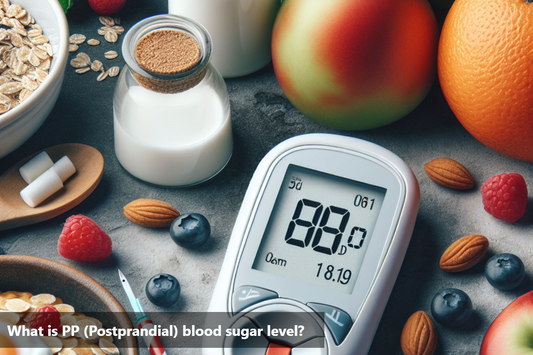The human body is like a complicated machine, and all its parts need to work together for us to stay healthy. One really important thing is the sugar level in our blood. This is how much glucose we have in our bloodstream, and it's super important for our well-being. Glucose is the main fuel that our body uses for everything, from basic cell stuff to thinking.
Knowing about blood sugar levels is crucial to understand how to keep our body healthy. We usually measure this in milligrams of glucose for every deciliter of blood, and it goes up and down during the day. The boss in charge of this is insulin, a hormone made by the pancreas. Insulin helps our cells take in glucose, and that's how it keeps the right amount in our blood.
Lots of things can change our blood sugar levels, so it's a pretty dynamic part of our body. What we eat and how active we are really matter. The food we eat, especially things like carbohydrates, gets turned into glucose during digestion, and that can make our blood sugar go up for a little while.
In this quick look, we'll explore how our body handles blood sugar, checking out the things that make it change. Knowing about these things helps us make good choices for a healthier life.
Understanding Blood Sugar Levels
It's important for the body to have the right amount of sugar in the blood to work well. Normally, the sugar levels should be between 70 and 140 milligrams for every tenth of a liter of blood. It's crucial to keep this balance because too much or too little sugar can be bad for health.
A hormone called insulin, made by the pancreas, is vital for managing sugar levels. When we eat, especially foods with carbohydrates, the body changes it into sugar called glucose. Insulin helps cells take in this glucose, giving them the energy they need. This process helps to keep sugar levels in the blood normal.
If sugar levels go up, the pancreas releases more insulin to handle the extra glucose. This stops sugar levels from getting too high. On the other hand, when sugar levels drop, the pancreas makes less insulin. This lets the body use stored glucose to keep the balance.
Understanding how insulin and glucose work is important for managing health. Knowing this helps in making smart choices about food, exercise, and overall lifestyle. The key is to keep a good balance between insulin and glucose for a steady and healthy sugar level.
Factors Influencing Blood Sugar Levels
Carbohydrate Intake: Foods rich in carbohydrates, such as bread, rice, pasta, and sugary snacks, can cause blood sugar levels to rise quickly.
Glycemic Index (GI): The GI of a food indicates how quickly it raises blood sugar levels. High-GI foods (like white bread and sugary drinks) cause rapid spikes, while low-GI foods (like whole grains and legumes) raise blood sugar more slowly.
Fiber Content: Fiber slows down the digestion and absorption of carbohydrates, leading to more gradual increases in blood sugar levels. Foods high in fiber, such as fruits, vegetables, and whole grains, can help stabilize blood sugar.
Protein and Fat: Consuming foods rich in protein and healthy fats alongside carbohydrates can slow down the absorption of sugar into the bloodstream, reducing blood sugar spikes.
Physical Activity: Exercise helps muscles use glucose for energy, which can lower blood sugar levels. Regular physical activity also improves insulin sensitivity, allowing cells to use glucose more effectively.
Medications: Certain medications, such as insulin and oral diabetes medications, can directly impact blood sugar levels by either lowering them (hypoglycemics) or raising them (corticosteroids).
Stress Levels: Stress hormones can cause blood sugar levels to rise. Managing stress through relaxation techniques like meditation and deep breathing can help stabilize blood sugar.
Sleep Patterns: Poor sleep quality or inadequate sleep can affect hormones that regulate blood sugar levels, leading to higher levels of blood sugar.
Hydration: Dehydration can lead to higher blood sugar concentrations. Drinking enough water helps maintain proper hydration levels and supports overall metabolic function.
Illness and Infection: Certain illnesses and infections can cause temporary spikes in blood sugar levels. Monitoring blood sugar levels closely during illness is important for managing diabetes effectively.
Why Blood Sugar Levels Fluctuate
The ups and downs in blood sugar levels happen because of different things going on in our bodies. One big reason for these changes is stress. When we're stressed, whether it's from something physical or emotional, our body releases hormones like cortisol and adrenaline. These hormones make the liver release glucose into the blood, causing a temporary rise in blood sugar.
Changes in hormones also play a big part. For instance, women might see their blood sugar levels go up and down during their menstrual cycle because of hormone changes. Conditions like polycystic ovary syndrome (PCOS) can also affect how sensitive our bodies are to insulin, leading to irregularities in blood sugar.
Genes exert a profound influence on blood sugar levels by regulating key aspects of glucose metabolism and insulin function. Variations in genes related to insulin production, insulin sensitivity, and glucose uptake into cells can impact how efficiently the body processes and manages blood sugar. These genetic factors contribute to individual differences in postprandial glucose response, fasting blood sugar levels, and overall glycemic control. Genetic predispositions also influence the risk of developing diabetes, with specific gene variants predisposing individuals to type 1 or type 2 diabetes based on their effects on pancreatic function or insulin action. Understanding genetic influences on blood sugar levels is crucial for personalized health management strategies, guiding interventions that aim to optimize blood sugar control and reduce the risk of metabolic disorders.
Other body processes, like the dawn phenomenon, also contribute to these natural changes. This is when our body releases glucose in the early morning, getting ready for the day. This can make fasting blood sugar levels a bit higher.
Knowing about these changes is important for managing blood sugar well. Keeping an eye on stress levels, using stress-relief techniques, and understanding hormone shifts can help people handle these natural variations. It's really important, especially for those with conditions like diabetes, to work with healthcare professionals. They can help come up with strategies to deal with these factors and keep blood sugar levels stable for overall health.
Conclusion
In conclusion, our exploration of blood sugar levels underscores their critical role in maintaining optimal health. We've learned that normal blood sugar levels, ranging from 70 to 140 milligrams of glucose per deciliter of blood, are essential for the body's proper functioning.
Insulin, produced by the pancreas, is a key player in regulating blood sugar levels. It facilitates the absorption of glucose by cells, ensuring a delicate balance. Factors influencing blood sugar levels, including dietary choices, physical activity, stress, and genetic predispositions, contribute to the dynamic nature of glucose concentration in the bloodstream.
Understanding why blood sugar levels fluctuate, be it due to stress, hormonal changes, or physiological processes like the dawn phenomenon, empowers individuals to make informed decisions about their health. By adopting mindful lifestyle choices, managing stress, and staying active, individuals can work towards maintaining stable blood sugar levels.
The importance of this stability cannot be overstated. Balanced blood sugar levels are not only crucial for those managing conditions like diabetes but are fundamental for overall health. Consistent monitoring, coupled with proactive lifestyle choices, forms the foundation for a healthier and more vibrant life. By prioritizing the maintenance of balanced blood sugar levels, individuals can take charge of their well-being and enjoy a more energetic and fulfilling lifestyle.
This Blog post is an initiative by DiabeSmart, to provide accurate and Nutritionist / Doctor approved information related to Diabetes. DiabeSmart is India's first Food brand designed specifically for Diabetics, that has been clinically tested on Diabetics and Pre-Diabetics to deliver 55% - 70% lower Sugar spikes. DiabeSmart is part of Lo! Foods - India's leading brand for Everyday Functional Health foods.







